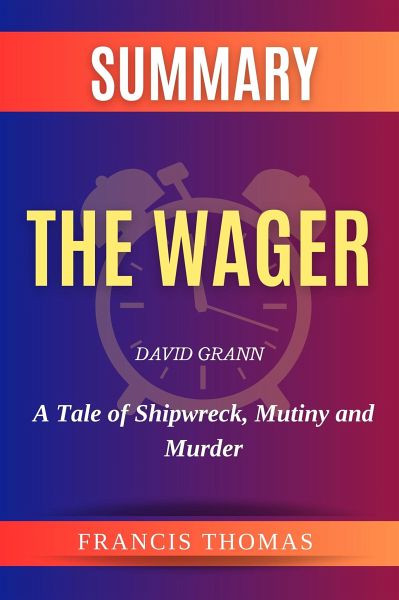A Complete Summary of the Wager David Grann's latest novel, "The Wager," is an extensively researched narrative that explores the dangers and acts of heroism within the British fleet during the 18th century. The British warship, "The Wager," is part of a fleet embarking on a mission to Cape Horn, chasing the Spanish with the goal of capturing a Spanish galleon filled with valuable treasures. This thrilling page-turner incorporates elements of a shipwreck, mutiny, and murder. One of the significant strengths of this book lies in its credibility. Grann takes meticulous care to cite numerous sources, ranging from the archives of the British Navy to novels penned by survivors of the calamity. The story vividly portrays the terrifying ordeal faced by the sailors as they struggle to survive in one of the world's most treacherous regions. Personally, the book's most captivating theme revolves around the effectiveness of warfare, encompassing its accompanying horrors and casualties. In David Grann's novel "The Wager: A Tale of Shipwreck, Mutiny, and Murder," a gripping story unfolds, intertwining elements such as typhoons, scurvy, shipwrecks, mutiny, and even cannibalism. The book recounts the true events of the British naval frigate Wager, which sank near the Patagonian coast of Chile in 1741. Stranded on a barren island, the survivors descended into a state of homicidal anarchy. Years later, when some of the survivors returned to England, they faced a court-martial, each presenting conflicting accounts of what had transpired in an attempt to save themselves. Grann, the author of "Killers of the Flower Moon" and "The Lost City of Z," came across John Byron's first-hand account of the voyage. Byron, who was aboard the Wager as a midshipman at the age of sixteen, chronicled the harrowing journey. Grann delved into archives, examining logbooks, letters, notebooks, and court-martial papers, to uncover the truth of what truly happened. He even ventured to the island in the Gulf of Sorrows to gain a deeper understanding of the castaways' experiences. The novel introduces David Cheap, a British navy officer, who achieved his dream of becoming a sea lord when he was made captain of the Wager but faced a shipwreck soon after. The prologue sets the stage for rebellion, survival, and dispute, unfolding during the imperial battle between Spain and England in 1740. It depicts the castaways' journey in a makeshift boat, enduring treacherous storms and hardships, with many losing their lives along the way. The survivors, upon reaching Brazil, made a startling accusation against their companions who had returned to England earlier. They claimed mutiny, challenging the perception that they were heroes. The subsequent discussions and accusations revealed the desperate fight for survival on the island, where the officers and crew struggled against famine and freezing conditions, attempting to establish order. Amidst these challenges, there were instances of murder, marauding groups, and acts of cannibalism. Grann's meticulously researched account sheds light on the dark and haunting experiences of the Wager's crew. The narrative examines the human condition in extreme circumstances and raises questions about the nature of survival and the blurred lines between heroism and desperation. The stage is set for a gripping and thought-provoking exploration of the events that unfolded during the ill-fated journey of the British frigate Wager. to be continued..
Dieser Download kann aus rechtlichen Gründen nur mit Rechnungsadresse in A, B, BG, CY, CZ, D, DK, EW, E, FIN, F, GR, HR, H, IRL, I, LT, L, LR, M, NL, PL, P, R, S, SLO, SK ausgeliefert werden.









